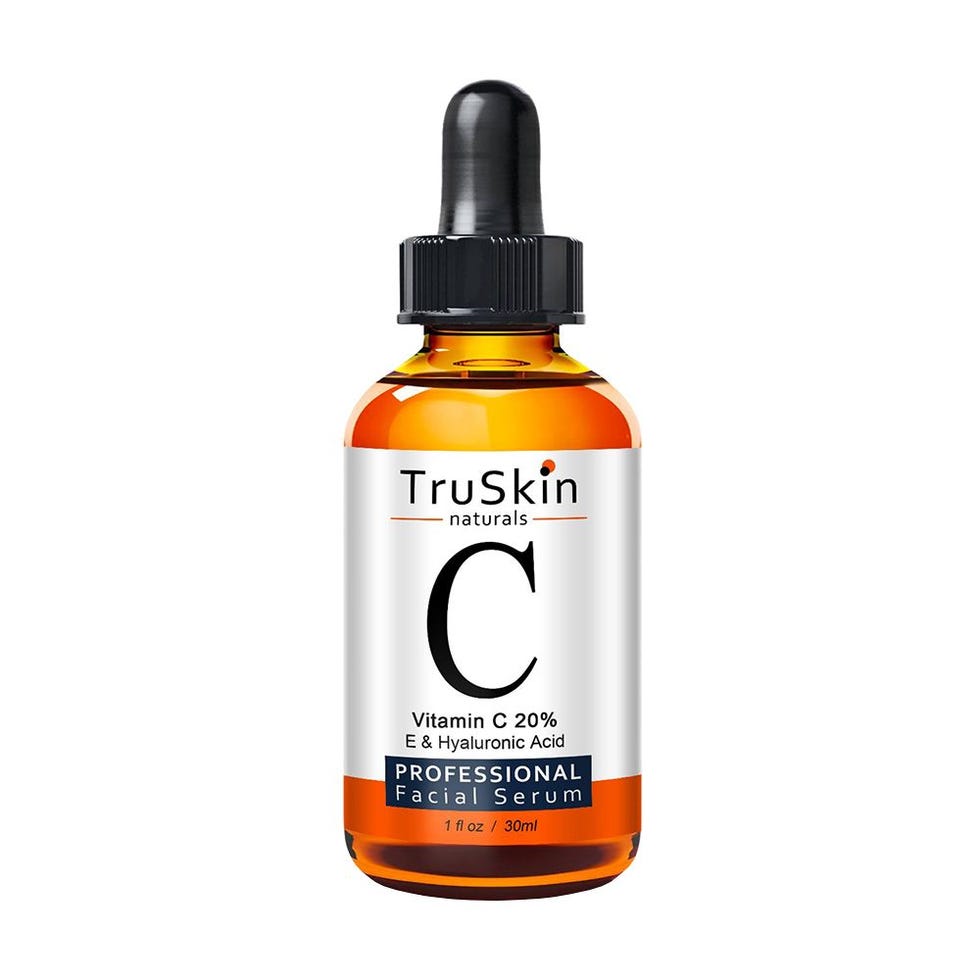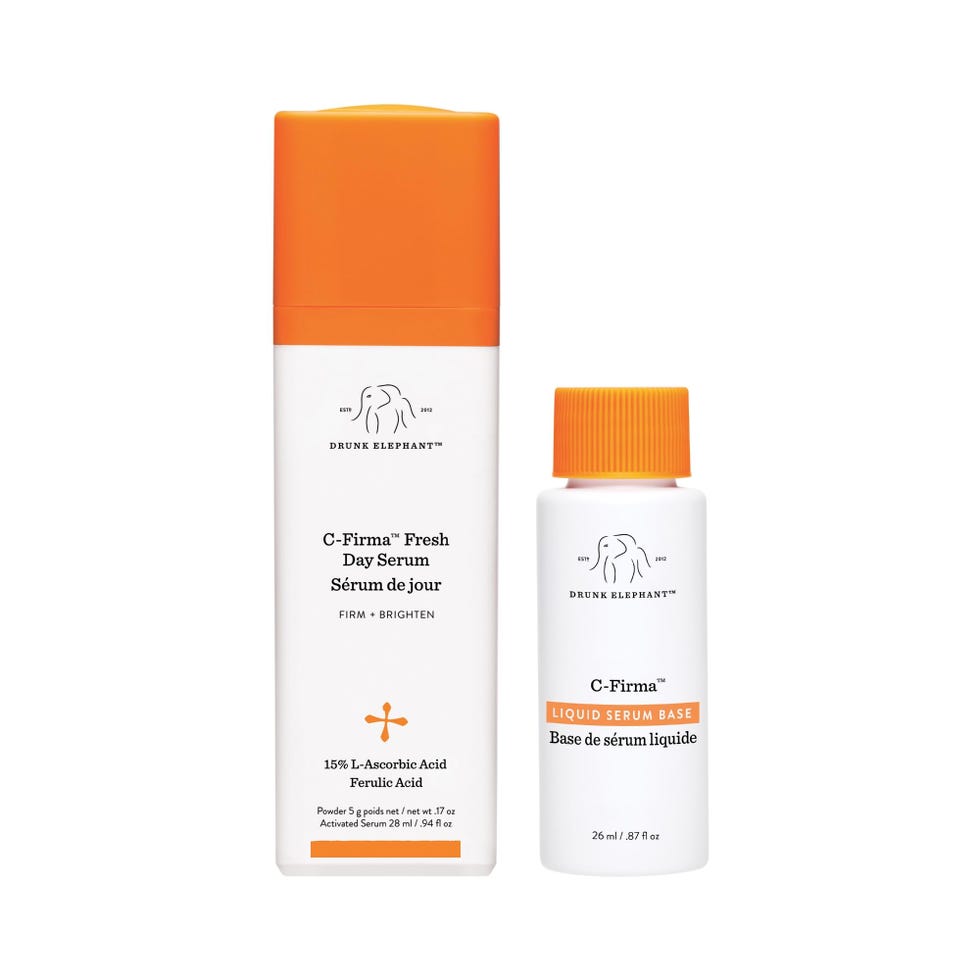When it comes to skincare products that work, antioxidant serums containing vitamin C reign supreme. But it’s crucial to know how and when to use vitamin C serum to reap the many benefits of vitamin C for your complexion.
“Vitamin C is an antioxidant that works to protect the skin against free radical damage and can help to brighten the skin, improve hyperpigmentation, and boost collagen production,” explains Marisa Garshick, M.D., a leading board-certified dermatologist at Manhattan Dermatology and Cosmetic Surgery in NYC. “Results may be seen after three to four weeks, but can take three to six months for full effect.”
Meet the experts: Janiene Luke, M.D., a board-certified dermatologist in Loma Linda, CA; and Marisa Garshick, M.D., a leading board-certified dermatologist at Manhattan Dermatology and Cosmetic Surgery in NYC
Ahead, experts explain exactly when to use vitamin C serums in your skincare routine, the main benefits, potential side effects, and more.
What does vitamin C do for your skin?Helps protect from environmental damage
“Vitamin C is a potent antioxidant that helps protect your skin from the sun’s harmful rays (UV damage) as well as other environmental insults,” explains Janiene Luke, M.D., a board-certified dermatologist in Loma Linda, CA. Antioxidants work by helping to reduce the free radicals that are produced when we are exposed to environmental aggressors like UV light and various types of pollution. “Free radicals can cause changes in our DNA and activate certain enzymes that are responsible for breaking down the collagen in our skin,” Dr. Luke adds.
By adding a vitamin C serum to your daily skincare routine, you may be able to fend off some of this free radical-induced cell damage and help ensure better-looking, healthier skin.
Improve visible signs of aging
Thanks to vitamin C’s antioxidant capabilities, topical application may help make skin look younger by protecting it from various environmental stressors (like the sun) that contribute to the appearance of aging. It may also improve the appearance of fine lines and wrinkles by boosting collagen production, which we naturally start to lose as we age (and can be broken down by free radical damage), explains Dr. Luke.
Brightens the complexion and evens skin tone
Vitamin C serums assist in evening and brightening the skin tone due to its role in supporting collagen production. These brightening properties, specifically the prevention of abnormal pigment production, can lead to reduced discoloration over time, Dr. Luke says. Typically, you may start to see “improved texture and a slight glow” in as little as a few weeks to a month, but more dramatic improvement in skin tone and brightening often occurs over several months.
When to use vitamin C serum
“Vitamin C is best to use in the morning as it helps to protect against free radical damage that can occur without any specific daily environmental stressors,” Dr. Garshick explains. “It is best to use daily for optimal benefit.”
While it’s not incorrect to use vitamin C serum during your nighttime skincare routine, you’ll maximize its benefits by using it during the day and avoid any interactions between vitamin C and other common nighttime skincare ingredients.
What should you not mix with a vitamin C serum?
“In general, it is best to avoid using vitamin C at the same time as any harsh ingredients that can be irritating, unless otherwise directed,” Dr. Garshick explains. When in doubt, consult your dermatologist, but there are a few ingredients that are generally best to be avoided in the same routine as a vitamin C serum.
These ingredients include exfoliating acids (like salicylic acid, glycolic acid, and lactic acid), benzoyl peroxide, and retinoids or retinols. “These active ingredients can be irritating when used alone, and the combination with vitamin C can potentiate this,” Dr. Luke explains. “Similarly, some of these ingredients can oxidize or inactivate vitamin C, reducing its effectiveness.”
If you’d like to use any of these other skincare ingredients, experts recommend using them during your evening skincare routine; and apply your vitamin C serum in the morning. Just be sure to closely monitor your skin for any signs of irritation.
How to use vitamin C serum
“Vitamin C serum is best applied in the morning after cleansing and before moisturizing and sunscreen,” Dr. Garshick explains. “If being used with other serums, it’s best to apply in the order of thinnest to thickest.” Here’s an example of a morning skincare routine using a vitamin C serum:
- Cleanser
- Vitamin C serum on clean, dry skin
- Hyrating serum (optional)
- Moisturizer
- Sunscreen
How to choose a vitamin C serum
“Unfortunately, not all vitamin C products are created equally, so it can be confusing to try to find the right vitamin C to use,” Dr. Luke explains. However, there are a few key tips to keep in mind when shopping for the right vitamin C serum for you:
Type and concentration of vitamin C. L-ascorbic acid is the most common ingredient found in vitamin C serums, Dr. Luke says. It is the active form of vitamin C, and it has been thoroughly researched and studied. “L-ascorbic acid can range in concentration, but if you select one that has 15% or 20%, these concentrations tend to be most effective,” Dr. Luke says. There are other forms of vitamin C, Dr. Luke adds, pointing to a lipid-soluble form of vitamin C called tetrahexyldecyl ascorbic acid (THD), which is a stable derivative that allows for good penetration and is often incorporated into products like vitamin C serums.
Packaging. If you are choosing a product that contains L-ascorbic acid, know that it tends to be unstable and may oxidize (or break down when exposed to light or air), Dr. Luke says. To keep your product stable, look for airtight packaging or a product in a darker colored bottle.
Other key ingredients. “Vitamin C is stabilized by and works synergistically with other antioxidants (such as vitamin E, ferulic acid), so you can look for products that are formulated with additional active ingredients,” Dr. Luke says.
 TruSkin Naturals Vitamin C Face Serum
TruSkin Naturals Vitamin C Face Serum
Now 20% Off
Credit: TruSkin Timeless Skin Care 20% Vitamin C and E Ferulic Acid SerumCredit: Timeless Skin Care
Timeless Skin Care 20% Vitamin C and E Ferulic Acid SerumCredit: Timeless Skin Care Drunk Elephant C-Firma Day SerumCredit: Drunk ElephantSide effects of using vitamin C serum
Drunk Elephant C-Firma Day SerumCredit: Drunk ElephantSide effects of using vitamin C serum
“Typically, vitamin C tends to be tolerated by most; however, some may experience irritation, redness, or dryness, especially if they have sensitive skin,” says Dr. Luke. She suggests those with sensitive skin perform a patch test, which involves applying a small amount to an area (like in front of the ear or along the jawline) and waiting 24 hours. If there is no irritation or other symptoms after the patch test, you can try the product on the rest of the face. “Similarly, people can opt to use vitamin C a few days per week and work up to daily use as tolerated,” adds Dr. Luke.
Related Stories
Shannen Zitz is an Assistant Editor at Prevention, where she covers all things lifestyle, wellness, beauty, and relationships. Previously the Editorial Assistant at Prevention, she graduated from the State University of New York at Cortland with a bachelor’s degree in English. If she’s not reading or writing, you can probably find her frequenting the skincare and makeup forums on Reddit or hogging the squat rack at the gym.
